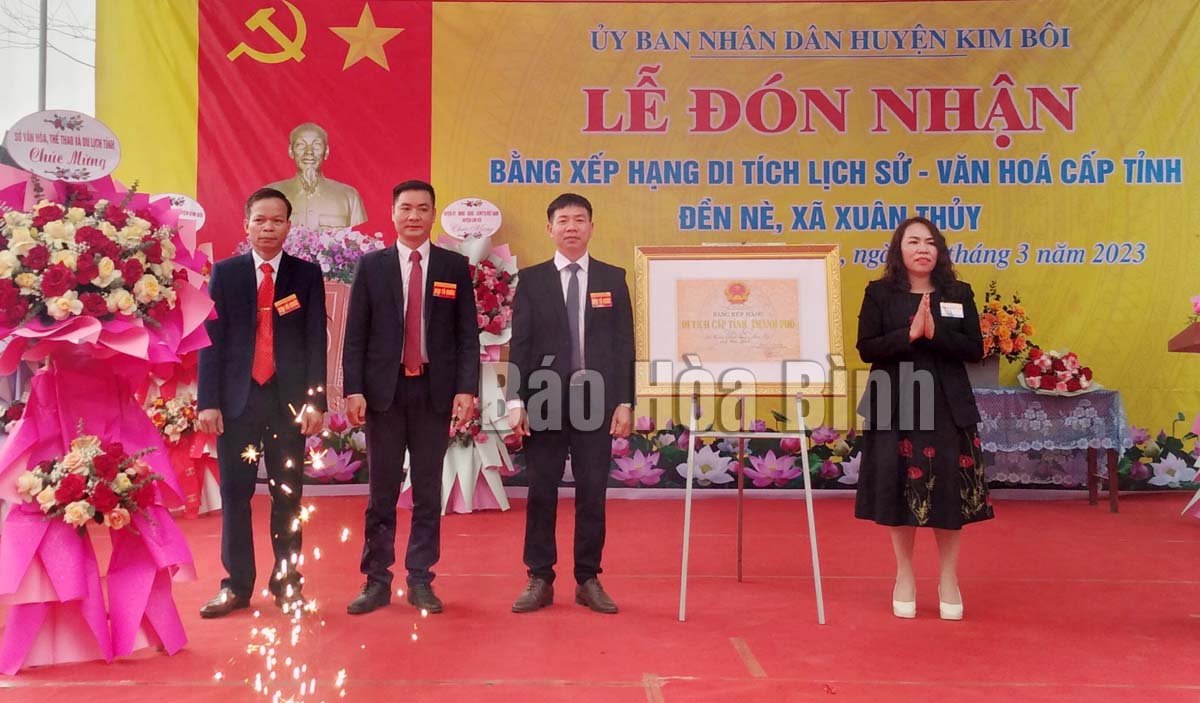
(HBO) - On March 15, the People's Committee of Kim Boi District held a ceremony to receive the certificate of ranking the historical - cultural relic at the provincial level of Ne Temple in Xuan Thuy commune. This is one of the eight monuments that have been ranked out of a total of 29 historical and cultural relics of the district that have been inventoried.

The leaders from the Department of Culture, Sports and Tourism were
awarding the certificate of ranking the historical - cultural relic at the
provincial level of Ne Temple in Xuan Thuy commune (Kim Boi) to the Party
Committee and the local authorities.
Ne temple is located in Bo Ne
hamlet, Xuan Thuy commune. This is a temple with a long history of formation
and development. Over the time, the old temple no longer exited. With the
efforts of the local government and people, in 2015, the temple was restored as
it is today. Along with that, the fesstival of Ne temple has been restored,
demonstrating the cultural values of Muong ethnic group in Kim Boi district.
Ne Temple is the place to worship
Son Than Princess (the nickname was Quach Thi Gioi, also known as Ba Chua Doi
Ne). She was the third daughter of King Quach Nhan Tho - the 13th generation of
Le dynasty. At present, Ne Temple still preserves 2 ordinations (the original)
and 1 copy of Ngoc Pha "Ha Bi xa Liet Vi Than Tich”. Every year, on the 7th day
of the first lunar month, a lot of the local people come to Ne temple to
worship with the respect, gratitude and prayer to wish for a peaceful and
prosperous new year. This is also an opportunity to educate the next
generations to always remember the merits of Ba Chua Doi Ne.
At the ceremony to receive the
certificate of ranking the historical - cultural relic of Ne Temple at the
provincial level, the leaders from Kim Boi District People's Committee
affirmed: This is an important and meaningful cultural event, creating a great
source of encouragement for the officials and the people of all ethnic groups
in the district in general and Xuan Thuy commune in particular. Ne Temple relic
is located in the system of relics and scenic spots of Kim Boi district, having
many favorable conditions for tourism development. In the future, Ne temple
relic will combine with the other relics in the district to create the routes
for the spiritual - ecological - archaeological - village tourism. Ne Temple
will be the spiritual destination of many tourists from every part of the
country, creating more resources for the local socio-economic development.
With an increasingly vibrant and widespread emulation movement aimed at building cultured residential areas and cultured families, Yen Thuy District has been making steady progress toward improving both the material and spiritual well-being of its people, while fostering a civilized, prosperous, beautiful, and progressive community.
Once lacking recreational spaces and community facilities, Residential Group 2 in Quynh Lam Ward (Hoa Binh City) has recently received attention for the construction of a new, spacious, and fully equipped cultural house. The project followed the model of state support combined with public contributions in both labor and funding.
The "All people unite to build cultural life" movement, which has been effectively integrated with Kim Boi district’s socio-economic development goals, is fostering a lively spirit of emulation across local residential areas, hamlets, villages, public agencies, and enterprises. In addition, through the initiative, traditional cultural values are being preserved and promoted, while community solidarity and mutual support in poverty reduction and economic development are being strengthened.
A working delegation of the Hoa Binh provincial People’s Committee led by its Permanent Vice Chairman Nguyen Van Toan on June 11 inspected the progress of a project to build the Mo Muong Cultural Heritage Conservation Space linked to tourism services in Hop Phong commune, Cao Phong district.
Born and growing in the heroic land of Muong Dong, Dinh Thi Kieu Dung, a resident in Bo town of Kim Boi district, in her childhood was nurtured by the sweet lullabies of her grandmother and mother. These melodies deeply imprinted on her soul, becoming an inseparable part of her love for her ethnic group's culture. For over 20 years, this love for her hometown has driven Dung to research, collect, and pass down the cultural values of the Muong people to future generations.
In the final days of May, the Ethnic Art Troupe of Hoa Binh Province organized performances to serve the people in remote, mountainous, and particularly disadvantaged areas within the province. These were not just ordinary artistic shows, but they were the meaningful journeys aimed at spreading cultural values, enhancing the spiritual life of the people and contributing to the preservation of ethnic minority cultural identities.



